What better way to assess a person’s ability to perform the activities of daily living than to ask them to actually perform those activities? The challenge, of course, is doing that in a controlled, scientifically validated environment.
WCG’s Virtual Reality Functional Capacity Assessment Tool (VRFCAT) allows clinicians and researchers to do just that: It assesses instrumental activities of daily living (iADLS) in a realistic interactive virtual environment. By incorporating gamification elements, it engages users in ways traditional assessments do not.
Going shopping
The tablet-based assessment measures four functional abilities: meal preparation, using transportation, shopping and managing currency.
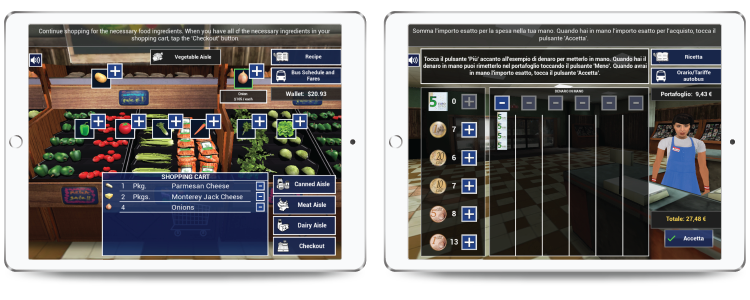
VRFCAT is “played” from a first-person perspective. The individual must complete a series of tasks related to making a meal. They include the following:
- Read a recipe.
- Search the pantry at home to see which ingredients they have on hand.
- Make a shopping list of the missing items (by crossing off the ingredients they found in the pantry).
- Pick up a bus schedule from the counter.
- Take the correct bus to the store.
- Pay the fare in exact change.
- Locate the items on the shopping list in the store.
- Pay for the purchases with exact change.
- Take the correct bus home.
The use of immersive first-person gaming technology makes the assessment engaging—even fun—for patients. The players follow on-screen directions and interact with objects and the environment –just as they do in their regular lives.
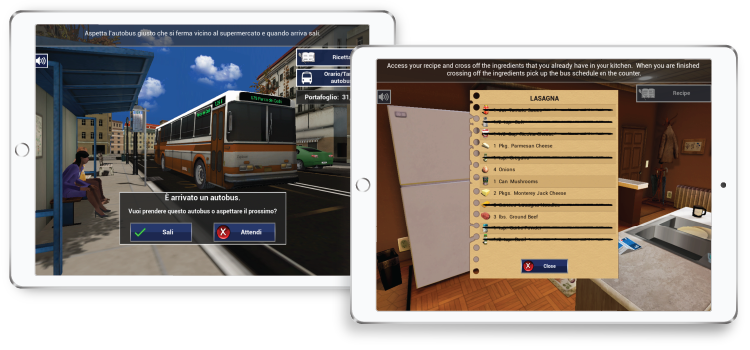
The assessment measures how long someone spends on each task and the number of errors they make. If the patient/player cannot complete a particular task in a specified amount of time—or makes too many errors–they are automatically advanced to the next objective. The assessment takes approximately 30 minutes to complete.
The simple interface makes it accessible for those without video game experience, those with limited literacy and—most importanty—individuals with cognitive deficiencies.
The VRFCAT Backstory
Richard Keefe, PhD, cofounder of WCG VeraSci, and his colleagues developed VRFCAT to measure functional improvement in clinical trials. They received support from the National Institutes of Health and the US FDA.
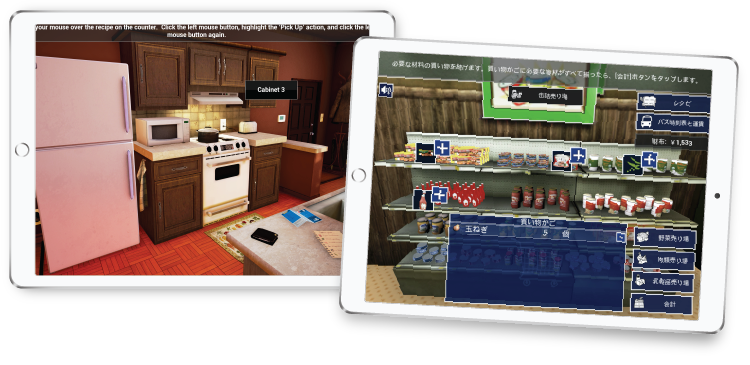
Originally standardized for assessment of functional capacity in schizophrenia trials[i], subsequent studies demonstrated its validity in other areas, including cognitive decline in older adults, Parkinson’s disease and schizophrenia.[ii],[iii],[iv],[v] Researchers have used VRFCAT in trials across various CNS indications although it’s most frequently used for Alzheimer’s disease and other forms of dementia.
Customized and adaptable
With six alternate scenarios, patients can repeat assessments without making the same dish each time and reducing the likelihood of memorizing the correct responses. An abbreviated version, the VRFCAT-SL, can be used as part of a comprehensive neuropsychological evaluation; it takes about 13 minutes.
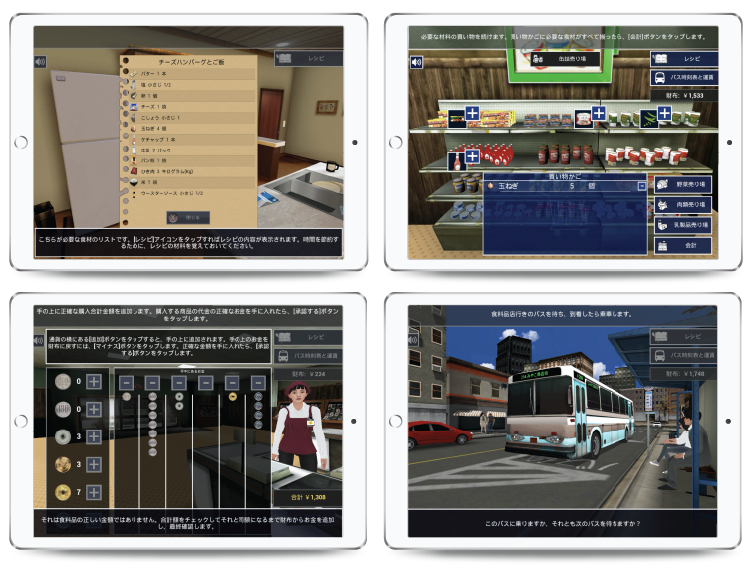
VRFCAT has been culturally and linguistically adapted for international use. It’s also available in over 30 languages, including Chinese, Russian, French, Italian, German, Polish, Japanese and Spanish (for the US). In addition to language translations, the adapted versions of the VRFCAT have culturally appropriate edits to the currency used, meal choices, and design of the busses and grocery stores. These adaptations help patients recognize familiar elements of their daily lives and reduce the likelihood of errors caused by using foreign money or ingredients.
Fit for purpose
As technology improves and society becomes more comfortable using digital tools in daily life, older assessments of functional capacity like the UCSD Performance-based Skills Assessment (UPSA) are becoming outdated. The UPSA uses physical props like analog phones with a dial pad, actual coins, and a phone directory to assess “real world” functioning. In contrast, VRFCAT is a digital assessment, taking full advantage of virtual reality technology to be more recognizable to modern users.
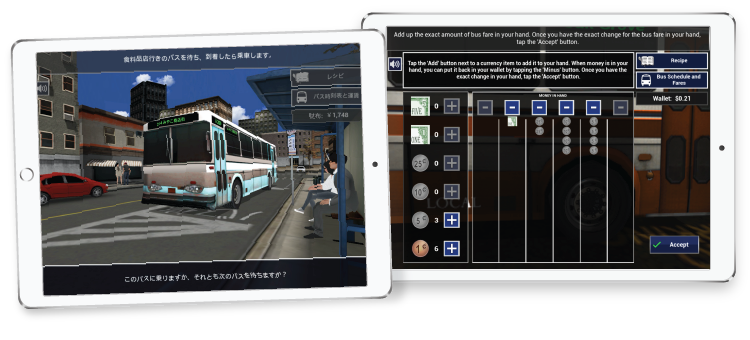
The VRFCAT meets the highest psychometric and regulatory standards, and has support from industry sponsors, the NIH, and the FDA. It was officially accepted into the FDA’s COA Qualification Program as a measure of functional capacity for schizophrenia treatment trials. VRFCAT is FDA 21 CFR Part 11 compliant.
It’s practical, easy to use, and patient-centric, representing the highest standard of cognition measurement available. Contact us to request a demo or to learn more.
References
[i] Atkins AS, Stroescu I, Spagnola NB, Davis VG, Patterson TD, Narasimhan M, Harvey PD, Keefe RS (2015) Assessment of age-related differences in functional capacity using the Virtual Reality Functional Capacity Assessment Tool (VRFCAT). J Prev Alzheimers Dis 2, 121–127
[ii] Turner TH, Atkins A, Keefe RSE. Virtual Reality Functional Capacity Assessment Tool (VRFCAT-SL) in Parkinson’s Disease. J Parkinsons Dis. 2021;11(4):1917-1925. doi: 10.3233/JPD-212688.
[iii] Harvey PD, Khan A, Atkins A, Keefe RS. Virtual reality assessment of functional capacity in people with Schizophrenia: Associations with reduced emotional experience and prediction of functional outcomes. Psychiatry Res. 2019 Jul;277:58-63.
[iv] Atkins AS, Khan A, Ulshen D, Vaughan A, Balentin D, Dickerson H, Liharska LE, Plassman B, Welsh-Bohmer K, Keefe RSE. Assessment of Instrumental Activities of Daily Living in Older Adults with Subjective Cognitive Decline Using the Virtual Reality Functional Capacity Assessment Tool (VRFCAT). J Prev Alzheimers Dis. 2018;5(4):216-234.
[v] Ventura J, Welikson T, Ered A, et al. Virtual reality assessment of functional capacity in the early course of schizophrenia: Associations with cognitive performance and daily functioning. Early Interv Psychiatry. doi: 10.1111/eip.12831
Schedule a consultation with our experts
There’s no time for doubt or delays. WCG’s clinical endpoint solutions demystify trial efficacy by reducing clinical trial error rate and, subsequently, the risk of inconclusive and unsalvageable studies. Complete the form to schedule complimentary consultation with our experts today. We’ll help assess your need, and discuss how WCG can assist.
